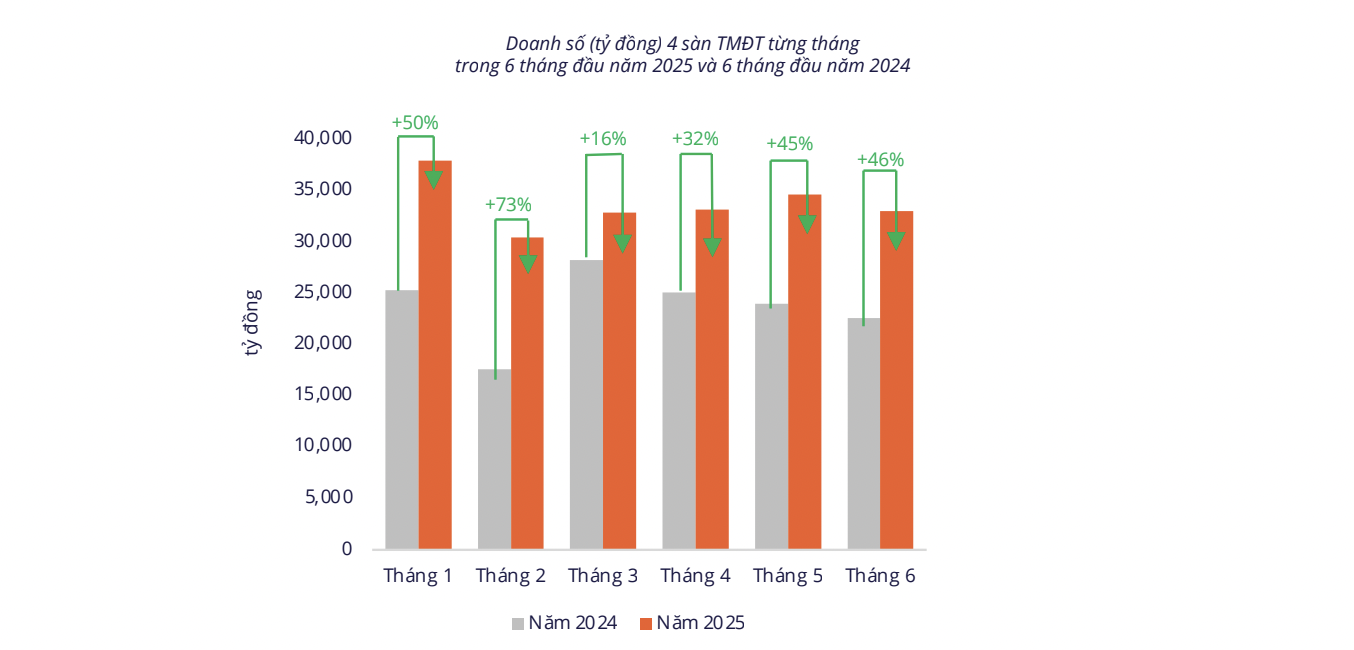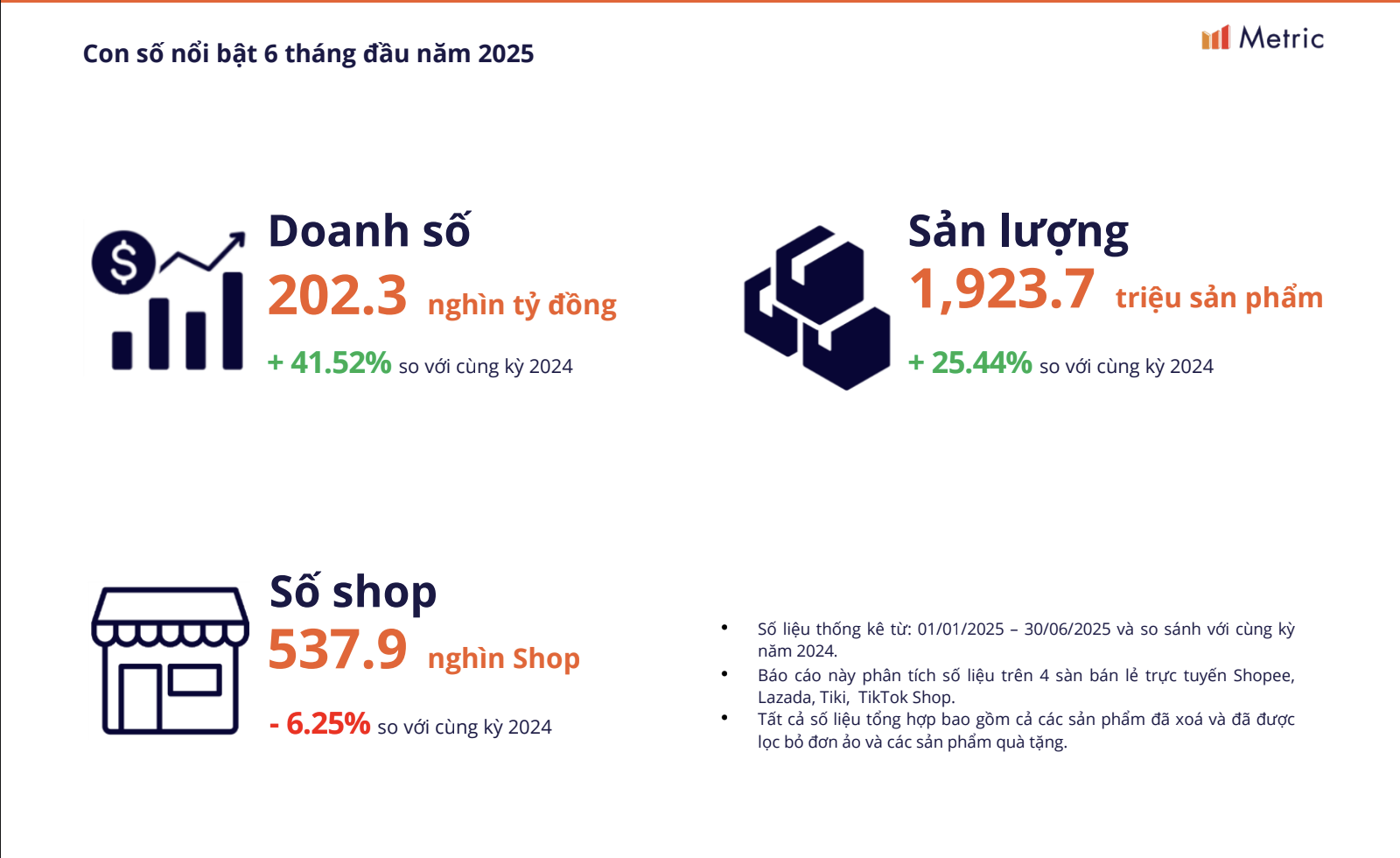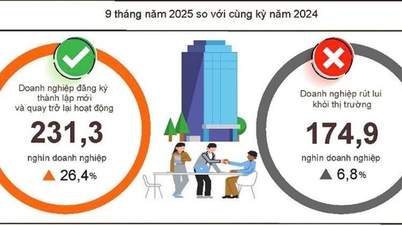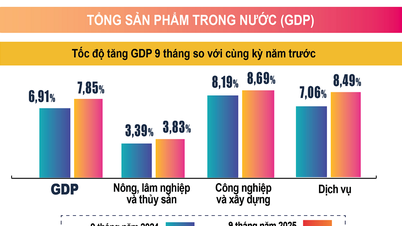
Tens of thousands of stalls leave the market
According to the latest report from the data analysis platform Metric.vn, the Vietnamese e-commerce market in the first half of 2025 recorded impressive numbers. Total sales on four major platforms including Shopee, Lazada, TikTok and Tiki reached more than 202,300 billion VND, an increase of 41.52% over the same period last year. The number of products traded reached 1.92 billion sales, showing that consumer purchasing power remains stable and continuously increasing.
In the second quarter of 2025 alone, sales reached nearly 101,000 billion VND with nearly one billion products sold. However, behind the brilliant picture of sales, there is a paradox: the number of sellers has decreased sharply.

E-commerce sales growth rate in recent months. Photo: Metric.
The report shows that by the end of the second quarter of 2025, there will be only about 537,900 active shops on the four e-commerce platforms, down 6.25% compared to the same period in 2024. Since the beginning of the year, more than 80,000 shops have left the platform, an unprecedented number. Compared to the second half of 2024, the market has lost more than 55,000 shops.
This decline reflects a fierce process of elimination. As sellers who cannot meet operating standards, cannot keep up with content trends or cannot afford rising costs, they are forced to withdraw. Instead, sales are concentrated more with big brands and those with the ability to invest systematically.
Ms. Mai Phuong, owner of a women's fashion shop, used to have about 300 products listed on Shopee, with an average revenue of 40 - 50 million VND per month in the period 2022-2023. However, from the beginning of 2025, orders gradually decreased to only 15 - 20 million VND/month, while advertising costs and floor fees increased continuously.
“Operating costs, platform fees, and especially competition from livestreaming have left us unable to cope. If we continue to increase our selling prices, we will lose customers. Last May, I decided to stop selling online and open a small shop in my hometown,” Ms. Phuong shared.
Ms. Phuong’s story, like many other sellers, clearly reflects a reality: e-commerce growth does not mean all sellers benefit. Small-scale shops that lack a systematic strategy will quickly be eliminated from the “game”.

E-commerce growth does not mean all sellers benefit. Photo: Metric.
According to Mr. Ta Hoai Nam, Director of Social Commerce of Novaon Group, the tightening of tax policies, product quality management and the campaign to crack down on counterfeit goods in the second quarter was also part of the purge. “Sellers who do not meet the criteria are forced to withdraw. The number of shops has decreased but revenue has increased, which is proof of this shift,” Mr. Nam commented.
Social commerce - opening a new "game"
From market movements, many experts believe that Vietnamese e-commerce is entering a new phase: not only based on promotions or low prices, but also on content experience and social engagement.
In particular, social commerce - commerce associated with entertainment activities will be an explosive trend. Social platforms such as Facebook, Instagram, YouTube are also entering the race, competing directly with Shopee, TikTok or Lazada. "From the perspective of sellers, this is a trend that should not be ignored and needs to be invested in appropriately," said Mr. Nam.

Mr. Ta Hoai Nam, Director of Social Commerce, Novaon Group.
Accordingly, the uniqueness of this trend is seen based on consumer behavior. If on e-commerce platforms, customers come because they already have a need to buy, then with social commerce, they are attracted by the entertainment of the platform. “While surfing videos or following KOLs/KOCs, they encounter suitable products and have an immediate need to buy. This opens up a large passive customer base, which can be up to about 70% and is completely different from the active customer base hunting for sales,” Mr. Nam analyzed.
In addition, the explosion of social commerce has led to a new “circle of connection”: between sellers - KOL/KOC - consumers. The boundaries of roles are gradually blurred. An individual can be both a consumer and a content creator to participate in affiliate marketing, even selling for their favorite brands. This integration helps increase trust and spread brand messages much faster than traditional advertising.

The explosion of social commerce has led to a new "circle of connection": between sellers - KOL/KOC - consumers.
Agreeing with this view, Mr. Tuan Dung, Head of TikTok Shop Partner & Creator Network, Digital Life Multimedia Joint Stock Company, said that social commerce does not only stop at expanding the customer base but also reshaping the way of selling. Livestreams used to create "megalive" sessions worth hundreds of billions, but the problem is that they only exist in short moments, are difficult to control content and leave little long-term impression. Meanwhile, short videos bring sustainability: they can be stored, spread for a long time and are easy to control.
“Compared to livestreams that generate instant revenue, short videos have the advantage of long-term value, easy to store and spread. Platforms themselves also tend to encourage sustainable, easy-to-manage content, so short videos will increasingly become the mainstay of social commerce,” said Mr. Dung.
Growth belongs to those who dare to change.
The first half of 2025 witnessed a strong wave of "elimination", but experts also predicted that the last months of the year will be the most exciting period, when the Christmas, New Year and Lunar New Year holiday seasons take place in succession, possibly contributing up to 60 - 70% of total annual revenue.
Entering 2026, the Vietnamese e-commerce market will no longer revolve around the race for numbers, but will move to a new phase with outstanding methods such as short videos, personalized AI applications and the development of integrated social networking & shopping platforms. At that time, growth will belong to businesses and sellers who dare to change.

Mr. Tuan Dung, Head of TikTok Shop Partner & Creator Network, Digital Life Multimedia Joint Stock Company.
According to Mr. Dung, sustainable growth also means that e-commerce does not just stop at numbers, but needs to build customer trust. Caring for and showing gratitude to old customers, building a community of users attached to the brand, or applying technology to predict and meet new needs... will become the "key" to long-term development. This is the stage where Vietnamese e-commerce must shift from chasing sales to consolidating the foundation, creating a sustainable, transparent and quality ecosystem.
The decline in the number of shops in 2025 is not necessarily a negative signal, but can be seen as an inevitable transition of a maturing market. Small retailers, those with substandard goods and lacking in systematic content will be eliminated, making way for sellers with the capacity to adapt.
In that context, new trends emerge as solutions, helping businesses reach passive customers, exploit larger markets and create seamless shopping experiences. Since the "elimination" of 2025, Vietnamese e-commerce is gradually reshaping the "rules of the game", where quality content and real-life experiences become decisive factors.
Source: https://vtv.vn/thi-truong-thuong-mai-dien-tu-2025-sau-cuoc-thanh-loc-luat-choi-moi-hinh-thanh-100250930035611816.htm







![[Photo] Opening of the 13th Conference of the 13th Party Central Committee](https://vphoto.vietnam.vn/thumb/1200x675/vietnam/resource/IMAGE/2025/10/6/d4b269e6c4b64696af775925cb608560)





























![[Photo] Prime Minister Pham Minh Chinh chairs the Government's online conference with localities](https://vphoto.vietnam.vn/thumb/1200x675/vietnam/resource/IMAGE/2025/10/5/264793cfb4404c63a701d235ff43e1bd)
































































Comment (0)